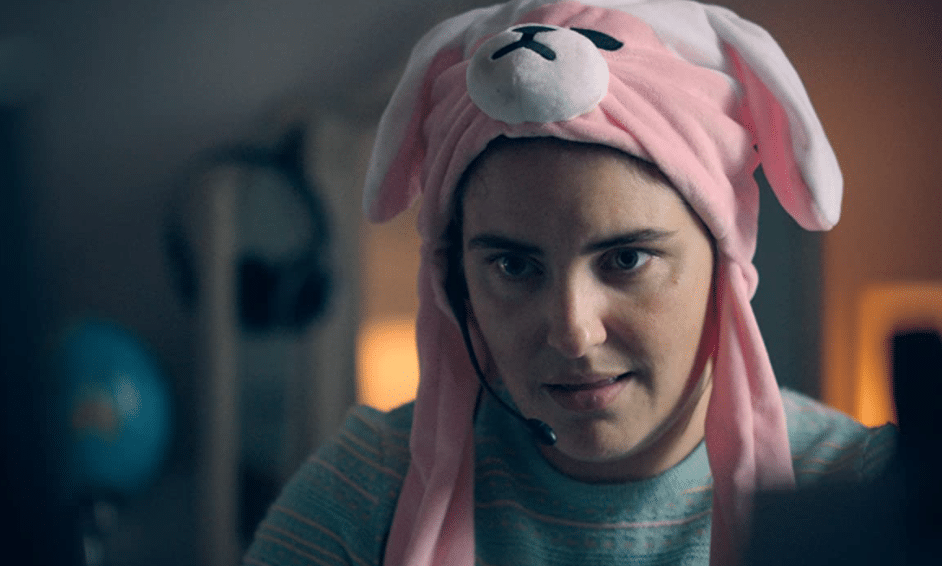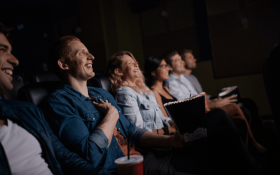An International Emmy has gone south of the equator for INSiDE, a short form online thriller, made by production company Luminous Beast.
Coming from the world-facing part of the US television judging giant, an International Emmy is a very fine award to put on the mantelpiece, while Luminous Beast is a pretty good name for a company.
It is run by three creators from New Zealand. Shoshana McCallum is a writer and actress, who began to get creative momentum in 2016 with a television pilot called Animals, followed by web series Stand Up Girl and then Creamerie, all interspersed with acting work, mostly in television.
Read: TV Review: Creamerie is a Kiwi treat
Dan Musgrove is a screenwriter, playwright and actor, whose theatre work has caught attention since 2012. He has the kind of television career and family that makes a feature article in NZ Woman’s Day.
Peter Salmon is a director and producer, who has worked in Australia as the setup and/or series director on shows like Doctor, Doctor, Rake, Secrets and Lies, Nowhere Boys, Offspring and Wanted. He joined Australian royalty as the husband of Neighbours and Wentworth actress Morgana O’Reilly.
At the moment the eight 15 minute episodes of INSiDE are trapped inside New Zealand as the compulsory guest of PRIME, SkyGo and Neon.
Suffice to say it is set in COVID, and is about an ultra-isolated young woman who takes tech support calls for growing video chat company Bunny, and hacks into stranger’s video calls and sabotages them, just to make some kind of contact. As the synopsis says:
But when Rose randomly connects with a frightening figure from her past, and something between them clicks, her personal walls come down and she finds trust and intimacy in the most unlikely place.
Against all her old instincts, Rose takes the plunge into a new relationship and rediscovers the joy of human connection.
But opening the door to her past has allowed all Rose’s old ghosts inside too and it isn’t long before a whole new kind of virus is spreading, with Rose battling sinister forces inside her own carefully sterilised home.
Not knowing who to trust or where to turn, Rose will face the awful reality that it might just be safer to go outside!
Besides the company owners, the script credits included Thomas Sainsbury, Nic Sampson and Kura Forrester. Liz DiFiore was the producer.
Screenhub connected with Shoshana McCallum and Dan Musgrove on Zoom. As always, I was fascinated by the way in which New Zealanders do so well with small productions. The meta-entanglement with COVID adds an extra zest to the tale, as we all relate to the strangest horror show of our times.
The interview
Screenhub: What made you come together? Was there some sort of strange electricity?
Shoshana: We had a short we decided to collaborate on. We got some funding with a good amount of time to develop it. And there was just a little bit of magic with the three of us and we were all friends. It’s just so special when that can work. So then we decided to make it official.
It felt like our brains were wired together in quite a fun way.
Screenhub: My sense of the New Zealand television sector is that probably everyone knows each other. Is that right?
Dan: Yes, that’s fairly accurate. And most people have worked together in some capacity. We’re both actors as well as writers, and its very common for people to have a few strings to their bow, because you need to.
Shoshana: We all rely on government funding. And there’s only so much to go around. It is really tough because not everyone gets to have a shot every time. But New Zealand feels like everyone’s a cheerleader in a way. It’s really, really lovely. And I would hope to work with everyone I’ve worked with again.
Developing the project
The series was both a fantasy based on the impact of COVID, and was produced under plague conditions as well. Peter Salmon was directing, Morgana O’Reilly starred as Rose, and they used their own house as the location. Shuffling their two young children in and out created a whole other layer of chaos. With strict COVID rules, both the characters and the creators were living in the same prison, and the makers effectively slept in the set.
Dan: It was stripped back in every sense of the word. We weren’t even in the same room when we started thinking about the idea. The whole process was remote so our overheads were really, really low. Not every show could be made inside one location like this because you would go insane, but it was perfect for us because we were drawing off that very contained feeling. The fact that we were all living it and writing about it worked very well.
Shoshana: We just knew that we had such intense limitations we just had to embrace them, to write for them. We had to figure out a way to put the whole thing together, and that’s part of the magic of the show that we leaned into.
Screenhub: It sounds like a long meditation on simplicity.
Dan: I think that was such a good lesson from making this series. You want to write establishing shot exterior Auckland City, and you can’t do it. So what are you going to do instead? Every single day, from writing right through the shoot, we having to just get creative to solve these problems. And hopefully that transcends the form, and even the audience can feel that subconsciously.
Shoshana: It was perfect for Rose as well – the character is so contained and she is so controlled. The constraints really added to the character study.
The mystique of New Zealand production
In the first major plot point, Rose bumps into someone who tormented her at school. He is the opposite of a stranger, and he remembered where she lived, and discovers that she still lives there after her parents died. Deformed by isolation, ravenous with need, she is projected straight back to her hideous memories – with no-one to rescue her and no ordinary life to hang onto. It is peak COVID.
Screenhub: While Australian drama often works in storyworlds which are very separate from its creators, there is a sense of suburban intimacy in so many non-Jackson New Zealand features, as if the creators and the characters come from the same milieu?
Dan: That is very interesting. Yes.
Shoshana: That is neighbourhood, yes.
Dan: It is totally accurate as well. During lockdown, every nook and cranny of your street is your world. Even in your own house, I know my wardrobe really well. Every little part.
Even in the synergy of the writers’ room, we can relate on an intimate level about every single location because we’ve all been most of the places we talk about and there’s common ground. Perhaps we can have more subtlety with it or approach it in a more delicate way.
Screenhub: Do you think you can make a living doing what you’re doing? Without leaving New Zealand?
Dan: It’s a very small industry. I like to think that we’re growing it here. And there’s nothing we can’t make here. And the stories I want to tell are here. But then the there’s so many great examples of New Zealanders who have gone overseas as well.
Screenhub: The parallels between our two societies are so fascinating. Because they are and are not like each other. We in Australia are facing some really tough dilemmas now – I think we live in a more alienated life. We live in a more competitive and more brutal and colder society where we don’t have the story worlds yet to really explore that brutality. What do you think is distinctive from your point of view about New Zealand production?
Shoshana: It’s a really good question, I think. What is it? For example, on this show, we all have to just come together and pull all our resources and all our talents.
To be honest, everyone does that on this sized show, or bigger budget shows because the money isn’t there to do what we want.
Dan: We always have thrived on being the underdog in most respects and historically we feel quite comfortable in that zone. When I think about New Zealand film, there’s something about remoteness. We are geographically remote but there is a sort of mental remoteness as well, of men and women alone in this harsh landscape.
So many films deal with it, and the isolation as well. I think we keep dealing with that same thing again, and again. People alone, yeah.
Shoshana: We’ve got this very intense kind of history, and connection to each other, because there’s so few of us, and we’re so remote. In the New Zealand industry you can knock on people’s doors, and you can write an email to someone that you might not be able to get in contact with, say, if we were in the US industry.
And because we don’t have to spend three years as a writing assistant, and learn everything and all the hierarchies there is individuality about us which we are allowed to hang on to.
Screenhub: Do you feel the urge to do things in a new and daring way? Some sort of pressure?
Shoshana: I think we’re really excited about daring ideas and bold ideas and courageous concepts but I don’t think we feel pressure. I think the stuff that’s available to us now is so exciting and I just want to rise to that level.
Dan: Moving forward we just focus on the heart of the characters. Let’s not just plot for the sake of plot, or gimmick for the sake of gimmick, or something fresh just because it’s fresh – it needs to have comment on the human condition, on the world we’re living in now. And that is spinning our wheels the most.
Shoshana: We are challenging everything. The story and the character and how we are doing it and robustly making sure we are not doing it because that is how we’ve always done it.
A question of trust
Screenhub: It seems as if you are being trusted quite rapidly and moving ahead organically without getting frozen? You are being allowed to use a big people’s pen rather than a crayon?
Dan: We’re really stoked that we got the opportunity to run with our idea, more or less, and we didn’t have huge constraints. I like to think that’s really built into the project and part of its why so special. We’re able to realise the vision we have without limitations.
Shoshana: It’s not always the case because the project was very low budget, and the first in lockdown, so it was like, ‘Let’s see what happens.’ Like in Australia so much of it is government funding, so you have a duty to the public to do it as cheaply as possible which doesn’t always work.
Screenhub: Was Sky [the pay TV provider] in from the beginning or did you show them a cut?
Dan: We pitched the idea to them early on. The original pitch was that it was Rear Window, using a computer screen rather than a window. They really responded to that and we moved really, really quickly. We had to often be inventive and run with the choices we had made.
But it did create a fantastic momentum for us.





